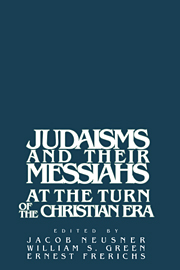Book contents
- Frontmatter
- Contents
- Preface
- List of Contributors
- 1 Introduction: Messiah in Judaism: Rethinking the Question
- 2 Wisdom Makes a Difference: Alternatives to “Messianic” Configurations
- 3 Salvation without and with a Messiah: Developing Beliefs in Writings Ascribed to Enoch
- 4 How the Authors of 1 and 2 Maccabees Treated the “Messianic” Promises
- 5 Messianism in the Maccabean Period
- 6 Waiting for the Messiah: The Spiritual Universe of the Qumran Covenanters
- 7 Philo and Messiah
- 8 Messiah and Gospel
- 9 Christology in Mark's Gospel
- 10 The Question of the Messiah in 4 Ezra
- 11 From Jewish Messianology to Christian Christology: Some Caveats and Perspectives
- 12 Mishnah and Messiah
- General Index
- Index to Biblical and Hermeneutical Texts
4 - How the Authors of 1 and 2 Maccabees Treated the “Messianic” Promises
Published online by Cambridge University Press: 08 January 2010
- Frontmatter
- Contents
- Preface
- List of Contributors
- 1 Introduction: Messiah in Judaism: Rethinking the Question
- 2 Wisdom Makes a Difference: Alternatives to “Messianic” Configurations
- 3 Salvation without and with a Messiah: Developing Beliefs in Writings Ascribed to Enoch
- 4 How the Authors of 1 and 2 Maccabees Treated the “Messianic” Promises
- 5 Messianism in the Maccabean Period
- 6 Waiting for the Messiah: The Spiritual Universe of the Qumran Covenanters
- 7 Philo and Messiah
- 8 Messiah and Gospel
- 9 Christology in Mark's Gospel
- 10 The Question of the Messiah in 4 Ezra
- 11 From Jewish Messianology to Christian Christology: Some Caveats and Perspectives
- 12 Mishnah and Messiah
- General Index
- Index to Biblical and Hermeneutical Texts
Summary
Great were Jacob and Moses and Balaam and the prophets of Israel for their prophecies, which were fulfilled in history down to the fifth century b.c.e. In many ways, greater still have been the same prophets and the seers of the books of 1 Enoch and Daniel for the impact of their prophecies that were still unfulfilled in the second century b.c.e. and even later. Those unfulfilled prophecies each promised one or more of the following: the permanent liberation of the Jews from exile, from foreign rule, and from all mishap; the erection at Jerusalem of a temple more magnificent than Solomon's, which God Himself would choose as His own place, glorifying it and making it secure from desecration and destruction; the rule over the Jews of a great and just king from the dynasty of David; their exaltation to imperial primacy among the nations; the conversion of the gentiles to follow the ways of the true God; the coming of a permanent era of peace; the resurrection of the righteous dead; and the punishment of all the wicked, past and present. Many of those prophecies omitted any mention of a king, but already Isaiah displayed the tendency to focus the fulfillment of such promises upon the coming of a single royal figure. From Isaiah on, prophets might predict that that king would accomplish some or all of the great things promised by God. On the other hand, some religious spokesmen might hold that God himself or other persons would fulfill all or most of the promises before the coming of the royal figure; then, that king would at least henceforth be the good ruler of a great restored Israel.
- Type
- Chapter
- Information
- Publisher: Cambridge University PressPrint publication year: 1988
- 3
- Cited by



